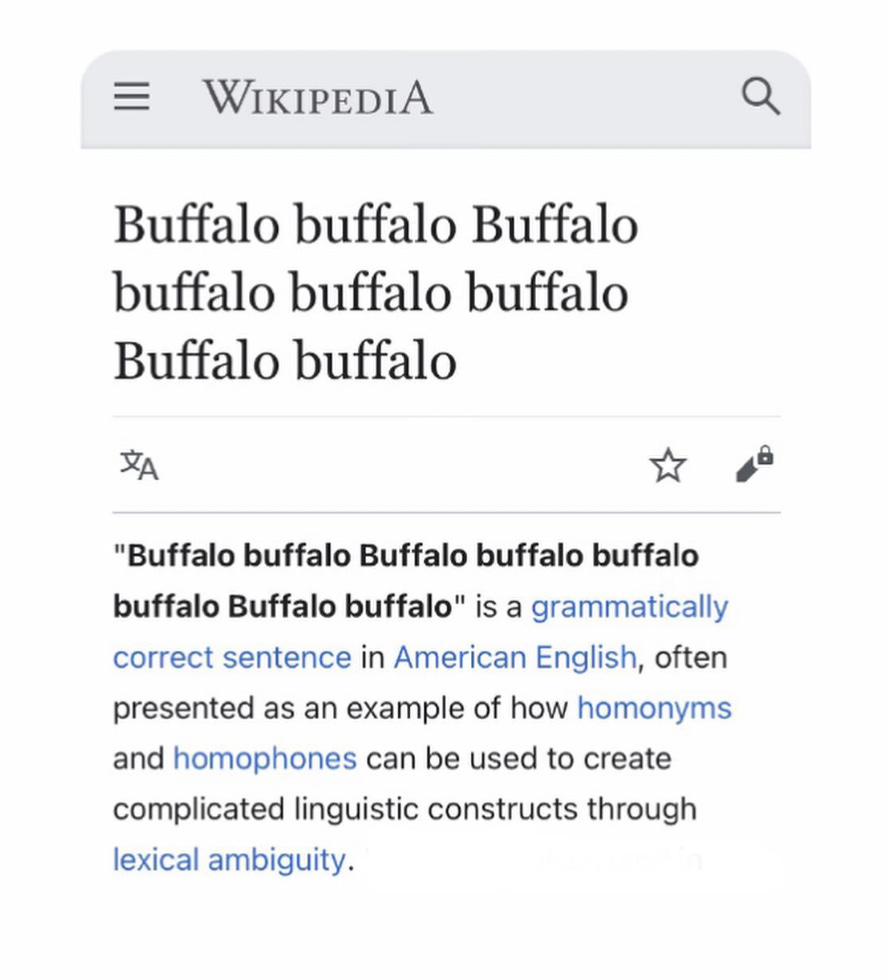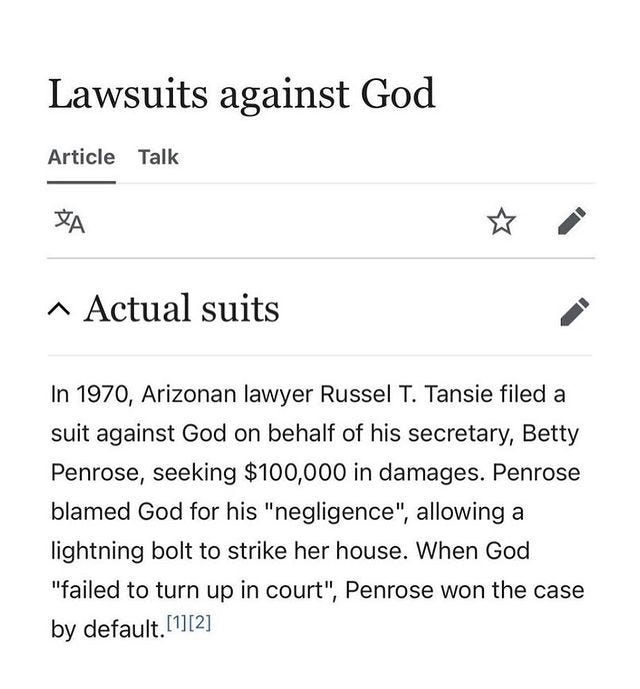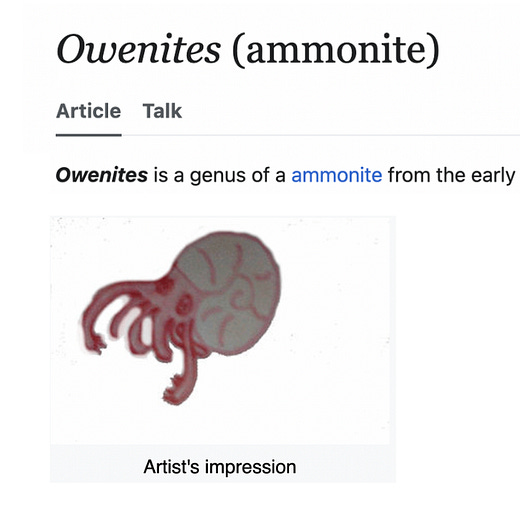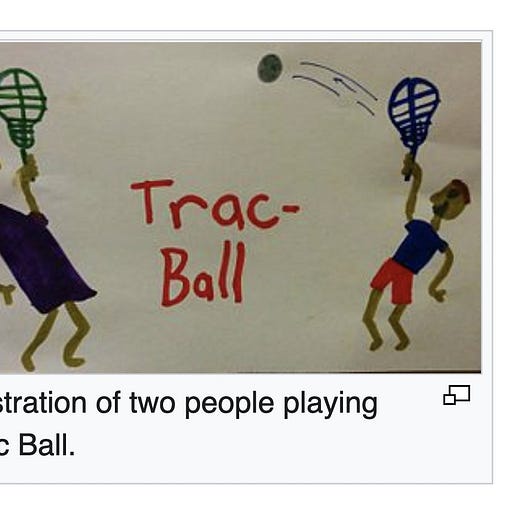ZINE MUNCH #5: Wikipedia Esoterica and ‘Rogue Editing’ (w/ Annie Rauwerda)
On @depthsofwikipedia and communal knowledge production
Annie Rauwerda is an internet culture writer and the admin of @depthsofwikipedia, a blog dedicated to Wikipedia esoterica; her account is perhaps the largest Wikipedia fanzine. In addition to running the page, she’s hosted a Depths of Wikipedia edit-a-thon (where first-time editors learn to use the site), runs a Depths of Wikipedia Discord community (now with ~1500 members) and occasionally does Wikipedia-based standup comedy. Her account is my favorite aggregator of the fan culture of the free encyclopedia—I DM her on Instagram and we talk by phone later that afternoon.

This transcript has been edited for clarity, concision, and accuracy.
Lucas Gelfond: I read your piece in Input about the debates editors have about whether or not to delete certain pages. How do you think talk pages shape intellectual culture on the site?
Annie Rauwerda: There’s this really good stat, I don’t know where I found it, but for every word on Wikipedia there’s something like six or eight words more behind the scenes on project pages or talk pages; whenever people are working together on something there’s going to be disagreements and questions and Wikipedia is certainly no exception. Sometimes it’s really eye-opening to see what parts of an article warranted the most discussion, sometimes it’s not what you would expect. There’s the classic example of the Star Trek Into Darkness controversy, I don’t know if you’ve heard about it…
LG: I haven’t, say more!
AR: There’s 40,000 words, people are spilling gallons of ink deciding whether to capitalize the “I” in the heading. It was ridiculous, but I think that Wikipedia editors tend to be more persnickety than most and with such attention to detail sometimes the editors will devolve into fairly inane debates, but other debates on talk pages are really wonderful and inspiring.
LG: What drove you to start the page?
AR: I didn’t start it with any intentions. It was just me being bored and thinking “I can’t believe nobody has made that on Instagram yet. As I started posting more I learned a lot more about Wikipedia, the open access movement, and the development of Wikis in general; I just read this book called The Wikipedia Revolution by Andrew Lih which came out in 2009, it talks more about the history of the technologies behind Wikipedia, and people like Ward Cunnningham [editor’s note: the developer of the first wiki], that was all really inspiring.
When I founded it two years ago I didn’t have this passion for free knowledge, but I think it’s developed over time; I’ve liked Wikipedia for a while. There’s this journal entry I have when I was in 5th grade where I was like “I love Wikipedia, I just read the entire page about milk and I want to remember it so I can be an expert on milk. I'm going to do it again tomorrow but on McDonalds.”
LG: Wikimedia’s brand director Zachary McCune once said about the account: “it’s a place where Wikipedia comes to life, like an after-hours tour of the best of Wikipedia.” How do you think @depthsofwikipedia interacts with the subculture of Wikipedia?
AR: I’ve been thinking a lot about the idea of a ‘Wikipedia fan’ because the Wikipedia editor base has been declining for the past five or ten years, and it would be very cool and helpful to recruit more people to edit. I’m not talking about day-in-day-out editing, but instead just looking at a typo and saying ‘oh that’s weird,’ being someone who looks at it and thinks ‘I should improve this’ or ‘oh, this isn’t sourced, I can add the source.’
There’s a lot of reasons why the editor base is declining. One that feels rather personal to me is that there’s a pretty steep learning curve when it comes to all of the guidelines. Like I said, the manual of style is pretty up for interpretation at a certain point, but when you’re a brand new editor, it’s very hard to master everything. Especially compared to the early days, like when you look at some of the edits from 2005, people are writing whatever they want. Whereas now if people go a little rogue and you know, maybe display the fact that they don't really understand what Wikipedia is, they're met with less grace and people aren’t really holding their hands as much. That’s one problem.
There’s a lot of people, like me two years ago, who would think ‘oh Wikipedia is awesome’ but I wouldn’t call myself an editor, even though I maybe have made a few edits here and there. If I can tap into those people, that would be really cool. Also, it’s really hard to estimate the genders of editors because you don’t even have to make an account to edit, but it’s somewhere between 80 and 90 percent male by recent estimates, so there’s a lot of efforts like Wiki Women in Red that are trying to close the gap there.
LG: How do you think about the community of @depthsofwikipeida interacting with the larger community of Wikipedia editors?
AR: I think that there’s a ton of overlap. I think that there are so many Wikipedia editors that are young and fairly irreverent, they’re not all buttoned up and stuffy, and I think people like that tend to enjoy Depths of Wikipedia.
LG: Depths of Wikipedia might be seen as something like a curatorial project, how do you think about what to publicize or the impact on pages when you bring attention to lesser known ones?
AR: I used to not really care, if something was on Wikipedia, I figured ‘that’s permission to post it.’ Now I don’t do that, because sometimes people will edit a page to make it funny and then send it to me and be like ‘this is so funny, you have to look at it.’ Now I know better, so if something was just edited to be more cheeky or something, then I try to avoid it.
In terms of bringing light to lesser known pages, I think that there’s a lot of things on Wikipedia that need to be improved. Everything needs updating because everything is happening all the time, and there's so many topics, like tiny little stubs that need to be expanded, so there’s a lot of instances on Wikipedia where the writing is kind of bad and funny. If I post something like that, now I’ll try to have a call to edit.
Recently I posted a photo of a little creature and it looked like a child’s drawing, it was funny because it was like ‘how is this seriously the best illustration we have of this.’ Then, I posted it on Twitter, and pretty soon this illustrator was like ‘oh, I should make a better one,’ and so she did. That felt good, but there’s certainly times where I post something and then it gets vandalized.
LG: Do you see Wikipedia is a publication? You said once it has ‘more personality than Britannica’ what do you think is behind that?
AR: Wikipedia has a manual of style which is very, very long. It’s supposed to have uniform style, which is really impressive. Before I started editing I was amazed—I can hardly keep the same style when I’m writing, and [Wikipedia] is really consistent while having so many editors. Honestly it’s like the Constitution, there are a few times where the manual of style is very open to interpretation, so different editors will go about things in different ways. Sometimes you see little bits of personality coming through.
I think it’s hard to make a broad claim about what has more personality, I know I did that earlier, I just don’t have a good reason, maybe it’s that people who are working at Brittanica do it for their jobs. People on Wikipedia have so much passion, because that’s the whole model. Wikipedia is not a site where you get paid to edit, that’s just not what it’s built for, so people tend to gravitate towards topics they are absurdly passionate about, and then you see personality come through. If you look at user pages, there’s also very fun stuff there.
LG: How do you think being able to view entries with all of the work that went into them changes your experience of the site?
AR: It makes it far more credible. If you either don’t know how to [view them], or don’t know that the records of changes exist, it might seem like Wikipedia is this static document that’s declaring the state of the world, whereas when you look at all of the recent changes, particularly for really active news issues, there are edits happening sometimes every minute.
There’s also an extension you can get for Wikipedia called Who Wrote That?, which is really fun because you can see where one editor might have really dominated an article. If you think they are biased, you can hover over [the article] and realize ‘oh, all of the parts that are really weird and positive are by this one editor.’ When you have the public record of edits you’re able to sniff out potential problems with the articles and overall I think that makes the whole thing more credible.
LG: Do you think the collaborative nature of the site makes it more rigorous?
AR: For sure! This happens to me all the time, I’ll write something, I’ll think ‘meh, whatever,’ I’ll move on with my life, and then I’ll come back and look at it and somebody, from perhaps anywhere in the world, will improve it. Like, maybe I made a dumb typo or did something weird, people will come to change it and make it better, and I have no idea who they are—they could be 10, they could be 90.
Another principle of Wikipedia is ‘assume good faith’ and I’ve found others are usually really good about that. I make mistakes all the time when I’m editing, and I’m a casual editor—I am not a hotshot on Wikipedia—but I think people are pretty good about knowing ‘okay, you tried your best and we’re all gonna work together to improve this because we have this common goal.’
LG: I read that the genesis of Depths of Wikipedia came from excerpts in a friend’s zine?
AR: Yeah! My friend Hajanyoo wanted to make a zine with the stuff all of our friends from high school were into in the early stages of COVID. I had just heard about Cool Freaks Wikipedia Club, group that with a similar premise [to Depths of Wikipedia]; I’m not sure if I was in it at the time, but I had done a few edits anonymously (as an IP address) and was thinking a lot about Wikipedia. So I screenshotted a few things I thought were cool on Wikipedia and just put them all onto a zine page.
Depths of Wikipedia is hosting another edit-a-thon in collaboration with the Smithsonian this fall, but Annie suggests that everyone “get their toes wet and start editing.” She also thinks everyone should check out Hatnote’s “Listen to Wikipedia,” a project which creates music based on Wikipedia’s recent change feed. Wikipedia has always stood out to me as one of the best affirmations of the usefulness of the internet, and a triumph of group collaboration. What are your favorite weird Wikipedia articles (you can reply to this email!)? I would personally submit either ummarell or
until the next!
~lucas












